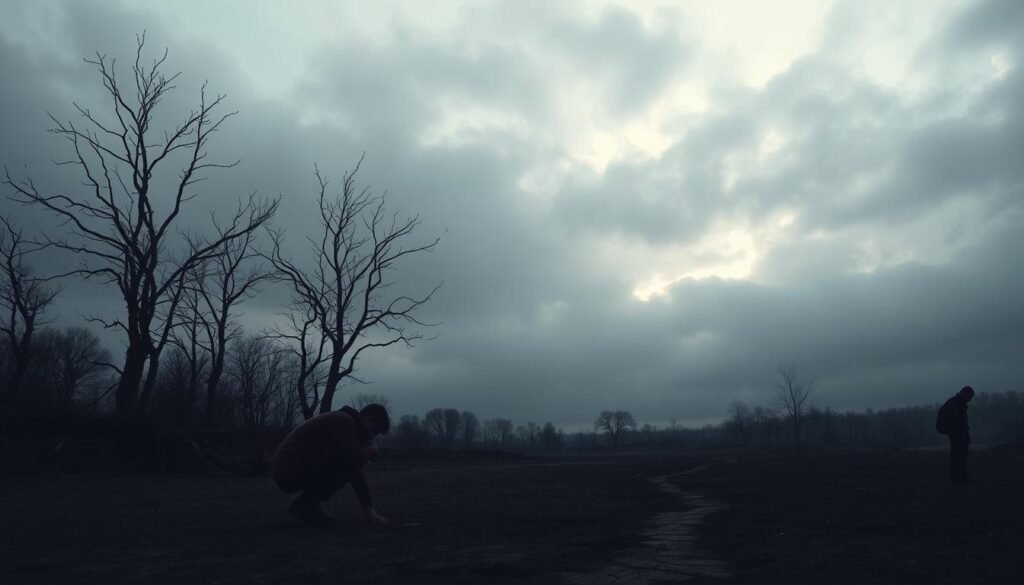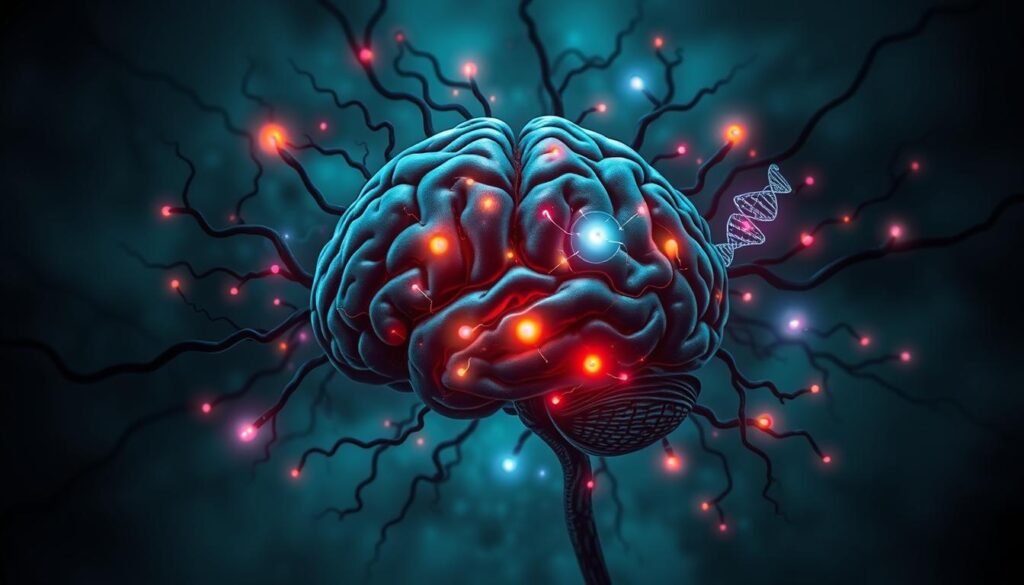Did you know about 17.3 million adults in the U.S. face depression every year? It shows severe depression is a big problem, not just a simple sadness. It can change people’s lives in big ways. People dealing with severe depression might struggle with daily tasks, find their relationships suffering, and often feel hopeless.
It’s easy to think these feelings will pass quickly. Yet, depression can deeply affect both the mind and body. Knowing how serious it is helps us see we’re not alone in this. Many share these tough experiences, creating a supportive community. This piece aims to highlight the signs and symptoms of severe depression. It wants to help you see when you or a loved one might need extra support with this mental health challenge.
Key Takeaways
- Severe depression affects 17.3 million adults in the U.S. annually.
- The symptoms of major depression can significantly interfere with daily life.
- Understanding depression symptoms is key to recognizing the need for help.
- Severe depression is more than just sadness; it is a serious mood disorder.
- Many individuals experience similar struggles, highlighting the importance of community support.
Understanding Depression
Depression is a mood disorder that brings continuous sadness and disinterest in activities once loved. To be diagnosed, one must show five or more symptoms for two weeks or more. It deeply affects one’s daily life, impacting work, friendships, and personal growth.
Several factors contribute to depression. These include differences in brain structure, chemical imbalances, hormones, and genetics. Knowing this helps us see why getting medical help is crucial for those who suffer over time.
There’s a stigma around talking about mental health. Many see depression as weakness, stopping them from getting necessary help. Understanding that depression is a medical issue, not a flaw, is key. It shows up differently in people. Kids might act out, while teens may show sadness or pull away.
Depression often comes with other issues, like anxiety or substance abuse. This makes finding the right help very important. There are various types of depression, such as major depressive disorder and seasonal affective disorder. Each one needs a different way to treat it.
Having people who support you is very important when dealing with depression. Lifestyle, friends, and mental health resources play a big role in getting better. Knowing about these supports gives hope and a way to heal for those struggling with these mood disorders.
What Is Major Depressive Disorder?
Major depressive disorder (MDD) affects millions annually. It shows as severe depression with symptoms that make daily life hard. Understanding its several forms helps recognize its real impact. MDD might happen just once or many times in a life. Without the right help, it can get worse.
Defining Major Depression
Major depressive disorder is the severest form of clinical depression. It comes with lasting sadness and hopelessness. About one in six people will face a major depression episode. It’s more than just feeling down; it’s a complex issue. Factors like biology and environment play a part. A diagnosis follows if someone has five symptoms for two weeks or more. These include fatigue, eating changes, and emotional distress.
Common Misconceptions
Some think depression shows a personal weakness. But, it’s vital to see it has biological causes. Genetics, brain chemistry, and life events can all make depression more likely. Understanding these facts helps us respond better and show more care. For more about spotting depression signs, visit this resource.
What Does Severe Depression Feel Like
Severe depression touches both the mind and body deeply. Knowing its effects helps in dealing with it better.
Emotional Impact
Severe depression fills the mind with persistent sadness. This sadness invades all parts of life. People face overpowering feelings of hopelessness and worthlessness.
This leads to great emotional distress. Reality becomes distorted, and mood swings happen. It makes people irritable and more distressed.
Because of these feelings, one might avoid friends and daily tasks. This greatly harms their life quality.
Physical Symptoms
The physical symptoms are strong and harmful. They include extreme tiredness, making daily chores hard.
Sleep problems make the fatigue worse. These issues can change how much one eats, causing weight loss or gain.
By evening, those with severe depression feel very drained. This starts a tough cycle to escape from.
It’s key to understand these emotional and physical effects to spot severe depression. Finding help is the first step to recovery.
For further details on depression signs and effects, check out this resource.
Recognizing Signs and Symptoms of Severe Depression
It’s key to spot severe depression early for effective help. People can show different emotional, thinking, and action changes. Knowing these signs helps in starting the conversation about getting help.
Emotional Distress
Severe depression can make someone feel very sad, irritable, or empty inside. It often causes a loss of interest in fun activities, known as anhedonia. These feelings can hurt relationships and make daily tasks hard, leading to loneliness.
Thought Patterns
With severe depression, negative thoughts are common. Folks might find it hard to focus and see things in a dark light often. Thoughts of death or wanting to end one’s life might occur frequently. Spotting these thoughts is crucial to understand how deep someone’s hurt goes.
Behavioral Changes
Depression can make people stop doing things they used to enjoy. This pulling away can make the loneliness worse. They may also start to ignore important tasks. These shifts can trap someone in a cycle of sadness, making it harder to recover.

| Sign/Symptom | Description |
|---|---|
| Emotional Distress | Deep sadness, feelings of emptiness, irritability, and loss of interest in activities. |
| Negative Thought Patterns | Pervasive negative thinking, difficulty concentrating, suicidal thoughts. |
| Behavioral Changes | Withdrawal from activities, lack of motivation, neglect of responsibilities. |
The Role of Fatigue in Severe Depression
Fatigue is a common sign of severe depression. It makes many people feel very tired. This makes it hard to do everyday things. This tired feeling can make their depression worse. Studies show over 90% of those with major depressive disorder (MDD) feel this way.
Even after depression improves, some still feel tired. One-third of people in remission still experience fatigue. A study with 66 patients found 90% felt tired even with antidepressants.
Fatigue includes physical, cognitive, and emotional tiredness. This makes it hard to separate it from depression. The Fatigue Associated with Depression scales (FasD) help doctors measure fatigue. Treating both depression and tiredness is key.
Choosing the right antidepressants can help reduce tiredness. Some antidepressants are better at lessening fatigue. Adding treatments like psychostimulants and regular exercise can boost energy. Doing 150 minutes of exercise a week helps fight fatigue and lifts mood.
Good sleep is also crucial. A stable sleep schedule and a diet with anti-inflammatory foods help lessen tiredness from depression.
It’s important to see how fatigue and depression affect each other. Treating fatigue improves well-being and may prevent depression from coming back. To learn more, check out fatigue in depression.
Thoughts of Worthlessness and Hopelessness
Many people with severe depression feel worthlessness. They often think none of their achievements matter. This feeling can keep them stuck in sadness, with no hope of getting better.
The feeling of hopelessness can make depression worse. People may feel like things will never get better. If these feelings last more than two weeks, getting help from a healthcare provider is important.
Depression can make you feel insecure and unmotivated. Dysthymia, a long-lasting kind of depression, is more common in women. It can make people feel hopeless about their future for over five years if not treated.
Taking antidepressants can help, but they take time to work. Getting help is the first step to feeling better. Talking about feelings can lead to ways of coping, like doing daily tasks, which is good for your mental health.

Women often feel depression differently than men. If you’re scared of having other health problems too, this fear can make you feel even worse. Understanding your family history is important in dealing with mental health.
It’s important to recognize these feelings to start getting better. Medicare can help pay for mental health support. Therapy or medical advice can help you fight feelings of worthlessness and hopelessness.
For more information on how to recognize and get help for depression, visit this resource.
Suicidal Thoughts: When to Seek Help
It’s vital to know when someone might be thinking of suicide. Noticing signs early can prevent a tragic outcome. This is because these signs often indicate someone is dealing with a serious mental health issue. They may need quick help, especially if they’re fighting things like depression or addiction.
Identifying Warning Signs
Here are important suicide warning signs to watch for in loved ones:
- Changes in eating and sleeping habits
- Loss of interest in usual activities
- Withdrawal from friends and family members
- Increased physical complaints linked to emotional distress
- Giving away favorite possessions
- Expression of bizarre thoughts or writing suicide notes
Understanding the Urgency
Reacting quickly to these signs can save a life. If you see someone showing these behaviors, talk to them. By asking straightforward questions, validating their feelings, and listening, you can truly help. Also, making their surroundings safer by removing dangerous items is a good step.
For immediate help, call the National Suicide Prevention Lifeline at 988. They connect you with counselors any time of the day. The U.S. Department of Veterans Affairs and the American Psychological Association offer helpful resources on mental health and treatment.
Factors Contributing to Severe Depression
It’s key to know what makes severe depression happen. We look at biological reasons and social plus psychological factors. These are major in spotting and handling severe depression right.
Biological Influences
Looking into depression’s roots often starts with biology. If depression runs in the family, there’s a bigger chance you might get it too. Neurotransmitters like serotonin being out of balance can shake one’s emotions deeply. Also, hormone changes make things tougher, especially for women who face depression more.

Social and Psychological Factors
Negative life events play a big role in depression. Traumas, no support, and ongoing stress can make depression worse. These stressors lead to harmful thought habits. People with rough childhoods or unstable lives might get hit harder by depression. When social and psychological issues mix, they can make mental health worse and keep the depression going.
| Factor | Impact on Depression |
|---|---|
| Genetics | Higher risk if family history exists |
| Brain Chemistry | Altered neurotransmitter levels contribute to symptoms |
| Hormonal Changes | Exacerbated symptoms, particularly in women |
| Traumatic Life Events | Can trigger onset or worsening of depression |
| Lack of Social Support | Increases vulnerability to depressive episodes |
| Negative Thought Patterns | Perpetuate feelings of hopelessness and worthlessness |
Treatment Options for Severe Depression
Addressing severe depression involves different treatment methods. This includes using medications, attending therapy sessions, and making lifestyle changes. These steps together often help people feel better. Antidepressants and therapy methods like talking to a counselor can be very effective.
Medications and Therapy
Medications are a key part in treating depression. Options include SSRIs, SNRIs, and other types of antidepressants. They help, but it takes time to see their full effect. Patients usually wait a few weeks to feel better. Along with medicine, Cognitive-behavioral therapy (CBT) is highly valued. It helps by changing negative thought patterns into positive ones. This improves how people feel overall.
It’s good to look at all options for the best treatment plan. Sometimes, combining different medicines works best. This ensures the treatment covers everything needed for recovery.
Lifestyle Changes
Making changes in daily life also helps with depression. It’s important to sleep well, stay active, and eat healthily. Exercise is especially good for reducing depression symptoms. It’s recommended to find activities that you enjoy and do them often.
These efforts support the treatment from medicine and therapy. They’re part of a complete approach to fight severe depression. By changing habits and seeking professional advice, people can stand strong against depression. This leads to better health and a smoother journey to recovery.
| Treatment Type | Description | Expected Time for Impact |
|---|---|---|
| SSRIs | Commonly prescribed antidepressants that improve mood by increasing serotonin levels. | 4-6 weeks |
| CBT | A type of therapy focused on changing negative thought patterns to improve emotional regulation. | 3-4 weeks for significant progress |
| Exercise | Physical activity that has been shown to reduce symptoms of depression. | Immediate benefits can be felt after sessions; ongoing improvements over time. |
| Balanced Diet | A healthy diet rich in nutrients that support brain health. | Varies, but can improve mood over weeks/months |
Conclusion
Severe depression impacts about 280 million people globally. It usually starts at around 20.5 years of age. Knowing about this illness is vital for recovery.
It’s important to recognize the many signs and symptoms. This helps people get help early on. Nearly half may not get better with just traditional treatments. This shows why we must keep looking for new ways to help.
Remember, you’re not alone in this. Severe depression hits many different folks. But with treatment, 70% to 90% see improvements. Often, this happens after 10 to 15 sessions of therapy.
Getting better is all about using known therapies, medicines, and changing some parts of your life. It’s key to keep trying to beat severe depression.
The path to feeling better is full of hope and support. Though depression seems tough, there’s good treatment out there. By focusing on your mental health and getting help, you can get back on track. This helps build strength and beat severe depression.